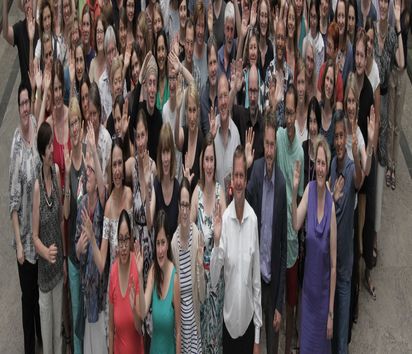
Living and Working Together
Brot für die Welt (Bread for the World) is committed to empowering all people to participate to the best of their ability in social, political and cultural life.
In its programme work, the agency ensures that its partner organisations include persons with disabilities in their programmatic work right from the project planning stage. The Protestant Agency for Diakonie and Development (EWDE), to which Brot für die Welt belongs, also adapts the workplaces of staff members with disabilities in case of special requirements.
Acting Responsibly as an Employer
The proportion of staff members with severe disabilities in the EWDE workforce is above the average compared to the private sector but below that for other public services in Germany. The agency is working to increase the proportion of employees with severe disabilities. Job advertisements state that we welcome applications from persons with disabilities. In addition, the EWDE awards numerous contracts specifically to institutions for persons with disabilities in order to support persons with disabilities in the workplace.
Supporting Employees in their Daily Work
During the construction of the EWDE office building, care was taken to facilitate access to the physical infrastructure for persons with disabilities: The passageways in the building are wheelchair accessible, some event rooms are equipped with induction loops for persons with hearing impairments, lifts announce the current floor and special parking slots in the underground car park are designated for people with impaired mobility. Assistance is provided for employees with disabilities who require it. The Brot für die Welt website was also designed with accessibility in mind - although we do not have a special version in plain language.
Engaged in Political Dialogue
At the political level, Brot für die Welt and Diakonie are committed to ensuring that the goals of the UN Convention on the Rights of Persons with Disabilities are implemented at the national as well as international level. The Declaration of the Diakonie and Development Conference towards an Inclusive Society (PDF) [166 kB] (German) from March 2014 states: "The Diakonie and Development Conference calls for intensified efforts at the level of the Federal Republic of Germany and the European Union level and worldwide at all political and social levels to implement the rights of persons with disabilities as they are recognised in the UN Convention on the Rights of Persons with Disabilities." To achieve this, the agencies engage in lobby and advocacy with parliamentarians, governments and at international conferences.
